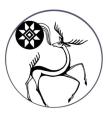Doctor of Shamanism Essay
I would like this essay to focus on the theological and moral aspects of Shamanism.
A first characteristic common at all shamans is searching for altered states of consciousness in order to be in closer contact with the spirit world. The methods to reach this altered state of consciousness, although important, are simply tools used by the shaman to reach his or her goal. They can be varied but, although they have clear symbolical, mythological, or sociological basis, I do not think that they are the core of the shamanistic beliefs. The latter run much deeper than that.
Generically speaking, shamans seek to understand the meaning of the universe in order to help their community. Both these aspects are equally important, as shamans are not looking for knowledge and enlightenment for their own sake, but for a specific purpose: that of helping him- or herself and others. This is I think an important point that differentiates the hermit from the shaman.
The belief held by shamans in many forms of supernatural beings was prevalent in the whole world in antiquity and has not disappeared today. It persists in most major religions. A Catholic praying to a Saint to reach a specific goal is applying the same basic belief as a shaman. The main difference is probably that the shaman is aiming for an actual encounter, a closer connection, with the supernatural being. In that sense, shamanism is not far from the old Mystery religions, which aimed at creating a close personal bond between the initiate and the God through an initiation process.
However, this similarity is not the whole story. Initiates of Mystery religions aimed at reaching a more intimate relationship with their favorite Deity, and following this path was generally a personal choice that would only bring enlightenment to the individual. Shamanism first of all seems to look for more varied experiences within the spirit world, not only to build a relationship with a single entity. In addition, the aim of the shaman is not only enlightenment, but also the healing of him- or herself and others. In that sense, shamanism is probably more altruistic than the ancient Mystery religions.
On the other hand, the healing function during antiquity was probably adequately covered by other – more mainstream – religions than Mystery religions. The social need was therefore already covered, and there was no need for Mystery religions to duplicate that process. It can probably be argued that the rise of science and medicine in our modern world took care of the need for healing for most people, therefore turning religions into purely philosophical and theological forums. I believe, however, that the need for spiritual healing is still there, and unfortunately not adequately covered in our time by either science or mainstream religions.
The role of magic in shamanism is as strong as it was in ancient Pagan religions, and even in the ancient Hebrew religion on which Judaic and Christian religions are based. This importance of magic actually never left popular belief, despite attempts from the organized religions of our time to eradicate it. It is also very strong in most Neo-Pagan religions today, which is a first common link between the latter and shamanism.
Strangely enough, Animism, the belief that a soul or spirit exists in every object, becomes more and more current within these Neo-Pagan religions. Their followers usually believe in the immanence of the Divine and the presence of God in the whole creation. This belief is not far from Animism, and is another important link between these Neo-Pagan religions and shamanism. Another such link would be the generic lack of organized church structure beyond the tribe or the circle.
I particularly liked the explanation given by the course on the seven principles of shamanism. They basically are based on the fact that our reality is entirely subjective, and that the will of the individual can change it as he or she wishes, without actual limitations. This is not only true of relations with the spirit world, but also of our daily life. By applying these principles and following the spiritual goals of the shaman, I believe one can become a better person, even if he or she does not attempt to reach altered states of consciousness to enter the spirit world. However, it is only be doing the latter than one would become a shaman.
The course was very interesting from a religious, anthropological and sociological point of view, and its principles can be applied by both shamans and non-shamans alike.
Rev. Baudouin Heuninckx
*******************************
The Universal Life Church is a comprehensive online seminary where we have classes in Christianity, Wicca, Paganism, two courses in Metaphysics and much more. I have been a proud member of the ULC for many years and the Seminary since its inception.
The Universal Life Church offers handfasting ceremonies, funeral ceremonies and free minister training.
As a long time member of ULC, Rev. Long created the seminary site to help train our ministers. We also have a huge selection of Universal Life Church minister supplies. Since being ordained with the Universal Life Church for so many years and it's Seminary since the beginning, I've watch the huge change and growth that has continued to happen.
Try our new free toolbar at: ULC Toolbar

No comments:
Post a Comment